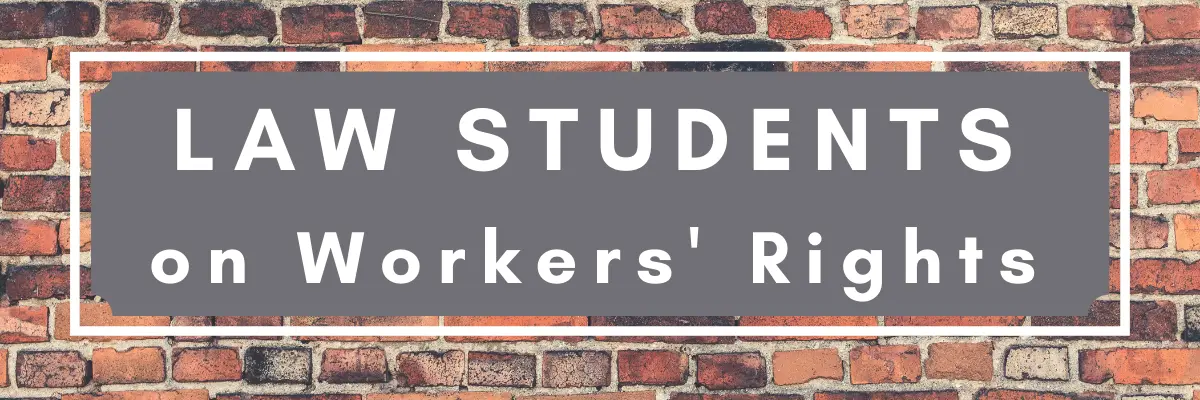
Social Media Use and its Impact on Future Workers
June 29, 2021
By Dan Wozniak
The Law Students on Workers’ Rights series publishes essays from current and incoming students at some of the top law schools in the country. These essays, submitted for the Charles E. Joseph Employment Law Scholarship, address the question “What are the biggest challenges facing workers’ rights in the future?”
Social media is increasingly used as a determinative factor in employment decisions, and as a result, has given rise to newly formed legal disputes. According to a survey conducted by Harris Poll on behalf of CareerBuilder, a third of employers have reprimanded or fired an employee based on content found online. With increasing social media use by teens in an era defined by pervasive political polarization and the unbalanced at-will compromise, today’s young people will pay a price for the content they once posted.
Social media employment disputes have resulted in precedent that attempts to simultaneously preserve first amendment rights and protect business organizations from having their brands damaged, confidential and proprietary information unwarrantedly exposed, and intellectual property stolen. While workers today have the right to speak their minds online, they can still be disciplined or terminated by their employer if their online content does not conform to their business organization’s interests or code of conduct.
In Caplan v. L Brands, the United States District Court for the Western District of Pennsylvania dismissed the plaintiff’s claim on the grounds that the perception of the accused employer about the meaning of the relevant speech controls the legal question of whether a social media related firing is, in fact, an illegal retaliatory firing. In other words, the intent of an employee when making a social media post is irrelevant in the eyes of the Court because of existing common law.
The “employment at-will” doctrine, which is stipulated in cases such as Caplan v. L Brands, grants employers the right to determine whether an employee fits within the internal organization of the firm, causing employer perception of problematic employee speech to supersede employee perception. In return, courts intrude when employers use their power to harm third-party interests.
As a result of this uncompromising default rule, an employee’s personal autonomy, which includes political affiliations, religious observance, and recreational activities, can be leveraged against them by broad and ambiguous civility codes. When Caplan was fired for her insensitive social media post, L Brand’s divisional company’s social media policy encouraged employers to “use common sense” and “be safe” and “ethical.” Such suggestive standards require interpretation and are open to manipulation by employers, managers, or co-workers who may unfairly target an employee.
The “employment at-will” doctrine and its effects on employee social media rights are slowly chipping away at worker’s personal autonomy. If employee actions or beliefs that lie outside the work relationship continue to contribute to employers’ employment decisions, this problem will only worsen.
According to the Pew Research Center, approximately 95% of U.S. teens report owning a smartphone or having access to one, and 71% of teens use more than one social network site. To put this into context, the vast majority of adolescents – a population of people whose brains are not fully developed and are increasingly experiencing psychological distress – have the ability to make public statements whenever they want.
Concurrently, teens are becoming more concerned with social and philosophical issues at a time of heightened partisan tension. While civic participation among young people is natural and can be healthy, political openness is not always conducive to landing or maintaining a private-sector job. Neither is cyberbullying or xenophobic content. According to a survey conducted by Common Sense Media, 52 percent of teenage respondents stated that they often or sometimes came across racist, sexist, or homophobic hate speech online.
While we do not know how many teens are spreading controversial or hateful messages on social media, we can assume that some are and that their future employers will not stand for it. In order to safeguard young people from future termination and unemployment, an addendum should be added to the at-will compromise that mandates employers not make employee-related decisions based on employee actions or beliefs that do not harm the business organization.
This alteration would simply impede employers from discriminating against employees that post benign opinions or actions on personal social media accounts and rebalance the power dynamic between employer and employee. Because of the difficulty of quantifying how a particular action or behavior may harm a business organization, reasonableness, as opposed to material evidence, should be the burden to meet to justify the disciplining or termination of an employee for online speech.
Altering a long-standing doctrine embedded in U.S. employment law is challenging, however, I believe it is necessary to restore the balance of power in the workplace. The voices of our youth should be protected, and unless they cross the line, they should be allowed to express themselves.
Reflections from Charles Joseph
The relationship between employers and employees sits at the heart of many employment laws. Dan Wozniak raises an intriguing notion: should employers be able to make employment-related decisions based on an employee’s actions years before their hiring date?
As social media becomes more and more dominant, what protections should workers have from discrimination based on their public comments? Could social media posts be used to justify mass layoffs? And would fired employees have any redress under wrongful termination laws? The pandemic and the increasing shift to work from home arrangements has made one thing clear – many workers value their autonomy.
Dan Wozniak holds a bachelor’s degree in public administration and journalism from Miami University in Ohio. He will attend the University of Iowa College of Law in fall 2021. Contact Wozniak on LinkedIn.
Charles Joseph has over two decades of experience as an NYC employment lawyer. He is the founder of Working Now and Then and the founding partner of Joseph and Kirschenbaum, a firm that has recovered over $140 million for clients.